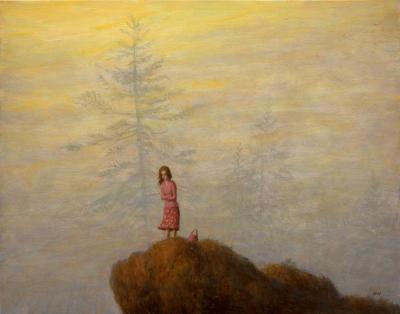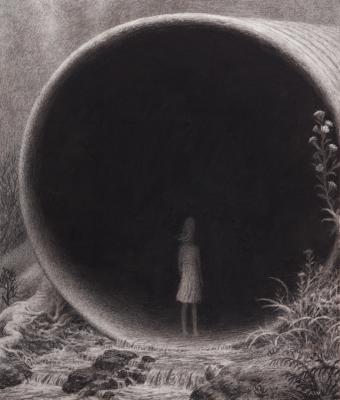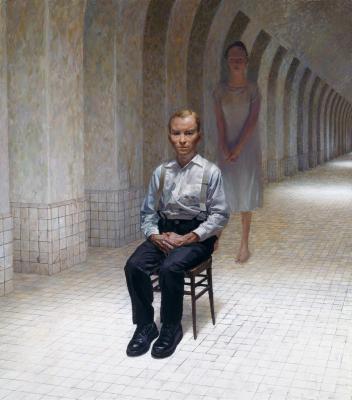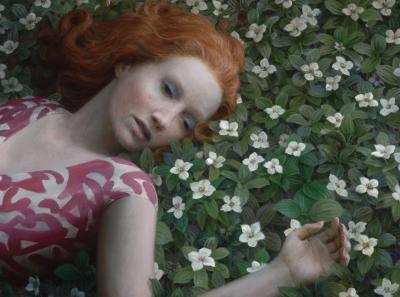Poems by BRUCE BOND and Paintings by ARON WIESENFELD
Scenic View

The woman alone atop the precipice,
what does she fear more, falling or jumping,
or doing nothing, standing here a while,
leaning shyly before the awful grandeur
of all that is missing. Hello down there,
she says, and it is the timbre of her voice
returning. Which is odd. One’s own voice is.
One’s own question answering its question.
One’s own long stare, exiled from a native
land that only seems so at a distance.
How many feathers does it take to fill
a wound like that, how many silent answers,
how many women as small as life is long.
She wonders, she aches, she knots her arms to bind
this body to its heartbeat in the wind.
Branches thrash, shower her in needles.
What does she care. She is elsewhere.
She stares into a glorious indifference
too large to fit into the heart’s eye,
and yet it does, the way the train’s roar
fits into the hungry tunnel, expanding.
What does she fear more, death or the great
dust storms that tear away the hieroglyphs,
the fury of earth as it shreds its garments.
No, she has seen death before. It is small.
Brittle as a fly in a storm window.
The scenic view is alive, too alive
for life alone. It is a childhood
grown holy with our first hesitations.
Our father, our canyon, our abandoned cradle,
bless this lady who shivers like a star
drawn to earth, the fallen, the other sky.
*
Runoff

The door to the otherworld is the mouth
of a drainpipe with a little wind inside it.
What girl could resist, her hair blown back
with the gentle force of all that darkness
as if in perfect stillness where she stands
alone and listens, she were falling through.
The door is not a door. It is a yawn
so monstrous it would swallow us whole.
It makes her smaller, more breakable
her glass heart, her jar of silent fireflies.
This is what it is to lie in the center
of some black mandala, never knowing
what source trickles through, what it is
in the shallow water between her legs,
in the body’s quiet questionings,
that frees the ghost to wander off ahead.
How is it the space of sleep is larger
than the body it’s in. How is it, we ask,
and the earth responds in whatever
language we would give it. It knows them all.
It understands none. Whatever water
comes this far, it comes from somewhere,
we trust. It tells us. We hear it crackle
like a million tiny typewriters.
It is writing a million tiny letters
to the part of us that writes. Or longs to.
After all we were born of it, this shadow.
So far behind we are walking toward it.
Hell. You look at anything this long,
and you are not looking anymore.
You are a girl before the unlit mirror,
who slips through, not far, but far enough.
You are the voice that oracles the tunnel,
the one you hear in the faint exchange,
when you swear there is no one, just you,
your face turned away from your face, you
the million tiny needles of the dark.
You the breeze that presses as it pulls.
*
Hallway

If you talk to the marble of the hall,
the hall talks to the man in the middle,
stone loyal, stone still, back straight against his chair.
It talks to the straps and mournful shoes
of a file clerk in Kafka’s Prague.
If you talk to the man, you are talking
to the woman friend who shadows him,
equally proper in her marble gown,
modest as a rock inside some rock
basilica and bank vault of the gods.
Man and woman echo one another,
they echo you, you who are the long view
they long to enter, the voice in the throat
of this, their emptiness, they look into.
If a column had hands, it would have hands
like these, the man’s fingers laced in his lap,
as hers too are laced, the v of her arms
draped down in an open zipper pattern.
One person’s closed curve is another’s
portal in or out, however shy the heart.
And yes, they are sweet, they are patient
with the lengthening silence between them
and you who search the eye that searches you.
Not you in particular. But the you
of the bricks in some cathedral tower,
their vertebrae stiff before the father
of the father of the mirror of the man
who parts his hair like a loaf of bread.
He is beautiful. He loves his body
and so fears it, feeds it, binds it fast
against the spine, faithful as echoes are
in a lovely death parade of echoes.
And if he rises through the ranks of deacons
to lead a parish of clerks down the hall
to nowhere, who are we to criticize.
We who move as the spirit moves, afraid
to look back at the door of the shadow,
or worse, to look and find no door, just
the canceled check of space that has our name
across it. And then it doesn’t. And then it does.
*
Flowerbed

To see the woman lie in a wide-eyed field
of flowers, her lids a heavy shade of blue,
her hair in fiery eddies against the leaves,
I wonder, is this look of someone half-blind
with weariness and pollen, the sweet smoke
of everything about her busting into bloom.
Does she gaze into the distance to see
the land dissolve where the sea-fog meets it,
where all she knows trails off into the pleasure
of knowing it once and letting it fall away.
Is the glass of what she looks through glazed
in Vaseline, amazed beyond amazement,
or does she read some microscopic script
etched across the surface of the lens.
What does she know of the force that pulls her
toward a sleep she does not enter, not yet,
this earth just strange enough to be the thing
she gives her self, the chest she lies against,
sinking like a sigh. What could be better,
say the lotus eaters in their island grasses,
the diet of flowers they crush as they roll
into each other and close their eyes again.
Some sleep it off. Some long to lie down
where they are lying, already and again,
the tiny cameras of the blossoms, flashing.
Too soon the end that’s late to everything.
What is it about getting home that is so
crucial now, as was the urge to leave it,
to step into some crowded train car
where faces lean into the morning paper.
Too soon the mist that veils the eye, the eye
that sets a veil on fire. Too soon the sun,
its call to something, someone in the fog,
to strike the sea with his long deep oars.
*
Bruce Bond is the author of eight published books of poetry, most recently The Visible (LSU, 2012), Peal (Etruscan, 2009), and Blind Rain (Finalist, The Poet’s Prize, LSU, 2008).
Aron Wiesenfeld has exhibited his paintings and drawings in 5 solo exhibitions including a retrospective at the Bakersfield Museum of Art, and a new show at Arcadia Gallery in New York from November 10 to 15, 2012.


